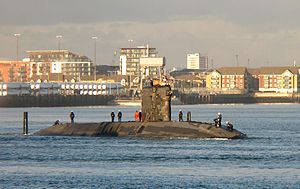HMS Trafalgar (S107)
 HMS Trafalgar, 2008
| |
| History | |
|---|---|
| Name | HMS Trafalgar |
| Namesake | Battle of Trafalgar |
| Ordered | 7 April 1977 |
| Builder | Vickers Shipbuilding and Engineering, Barrow-in-Furness |
| Laid down | 15 April 1979 |
| Launched | 1 July 1981 |
| Commissioned | 27 May 1983 |
| Decommissioned | 4 December 2009 |
| Homeport | HMNB Devonport, Plymouth |
| Fate | Awaiting Disposal |
| Badge |  |
| General characteristics [1] | |
| Class and type | Trafalgar-class submarine |
| Displacement | |
| Length | 85.4 m (280 ft)[2] |
| Beam | 9.8 m (32 ft)[2] |
| Draught | 9.5 m (31 ft)[2] |
| Propulsion |
|
| Speed | Over 30 knots (56 km/h), submerged[2] |
| Range | Unlimited[2] |
| Complement | 130[2] |
| Electronic warfare & decoys |
|
| Armament | |
| Service record | |
| Operations: | Operation Veritas (Afghanistan) |
HMS Trafalgar is a decommissioned Trafalgar-class submarine of the Royal Navy. Unlike the rest of the Trafalgar-class boats that followed, she was not launched with a pump-jet propulsion system, but with a conventional 7-bladed propeller.[3] Trafalgar was the fifth vessel of the Royal Navy to bear the name, after the 1805 Battle of Trafalgar.
Operational history
[edit]In 2012 a Royal Navy submariner was jailed for 8 years for trying "to pass secrets to the Russians that could have undermined Britain's national security"; one element of this was information on "a secret operation undertaken by HMS Trafalgar.[4][5]
Combat history
[edit]After Operation Veritas, the attack on Al-Qaeda and Taliban forces following the September 11 attacks in the United States, Trafalgar entered Plymouth Sound flying the Jolly Roger on 1 March 2002. She was welcomed back by Admiral Sir Alan West, Commander-in-Chief of the fleet and it emerged she was the first Royal Navy submarine to launch Tomahawk cruise missiles against Afghanistan.[6]
Grounding incidents
[edit]In July 1996, Trafalgar grounded near the Isle of Skye in Scotland.[7]
In November 2002, Trafalgar again ran aground close to the Isle of Skye, causing £5 million worth of damage to her hull and injuring three sailors. She was travelling 50 metres below the surface at more than 14 knots when Lieutenant-Commander Tim Green, a student in the "Perisher" course for new submarine commanders, ordered a course change that took her onto the rocks at Fladda-chuain, a small but well-charted islet. Commander Robert Fancy, responsible for navigation, and Commander Ian McGhie, an instructor, both pleaded guilty at court-martial to contributing to the accident. On 9 March 2004 the court reprimanded both for negligence. Green was not prosecuted, but received an administrative censure.[8]
In May 2008 it was reported that the crash was caused by the chart being used in the exercise being covered with tracing paper, to prevent students marking it.[9]
Decommissioning
[edit]Trafalgar was decommissioned on 4 December 2009 at Devonport.[10]
References
[edit]- ^ Jane's Fighting Ships, 2004-2005. Jane's Information Group Limited. p. 796. ISBN 0-7106-2623-1.
- ^ a b c d e f g h Bush, Steve (2014). British Warships and Auxiliaries. Maritime Books. p. 12. ISBN 978-1904459552.
- ^ a b Graham, Ian, Attack Submarine, Gloucester Publishing, Oct 1989, page 12. ISBN 978-0-531-17156-1
- ^ Hopkins, Nick (12 December 2012). "Royal Navy submariner jailed for trying to pass secrets to Russia". The Guardian. Retrieved 9 September 2022.
- ^ Cheston, Paul; Razaq, Rashid (13 November 2012). "Royal Navy petty officer admits trying to give nuclear submarine secrets to Russia". Evening Standard. Retrieved 9 September 2022.
- ^ Trafalgar Returns
- ^ House of Commons Hansard Written Answers (publications.parliament.uk)
- ^ "Latest Scotland, UK & World News - The Daily Record". dailyrecord.co.uk. Retrieved 7 August 2016.
- ^ Dawar, Anil (23 May 2008). "Submarine's £5m repair bill blamed on tracing paper". The Guardian. Retrieved 7 August 2016.
- ^ "Submarine's final sailing to base". BBC News. 10 November 2009. Retrieved 9 September 2022.
External links
[edit]- Royal Navy HMS Trafalgar (royalnavy.mod.uk)
- MaritimeQuest HMS Trafalgar pages (maritimequest.com)
- The BBC - Pictures of Trafalgar's final voyage (news.bbc.co.uk)
